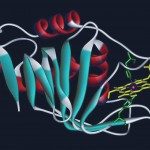Link to Pubmed [PMID] – 7751021
Immunology 1995 Mar;84(3):388-95
Recent work has shown that T lymphocytes undergo apoptosis upon treatment with the glucocorticoid analogue dexamethasone. These cells can be protected from the effect of dexamethasone by interleukin-2 (IL-2) or IL-4. We were interested in analysing whether a transfected cell dependent on three different lymphokines could be protected by them from the effect of dexamethasone. In addition, we took advantage of our cellular system, in which we expressed intermediate- or high-affinity IL-2R independently, to analyse the role of these receptors in the protection from glucocorticoid-induced apoptosis. In this report we show that IL-2 rescues murine T cells expressing exogenous intermediate- (TS1 beta) or high-affinity (TS1 alpha beta) IL-2 receptor (IL-2R) from dexamethasone-induced apoptosis. This result suggests that intermediate-affinity IL-2R alone can replace high-affinity IL-2R for the protection from the effect of dexamethasone. In addition, IL-4 and IL-9 are rescue-factors, as well as IL-2, of glucocorticoid-treated TS1 beta and TS1 alpha beta cells. Our data suggest that the presence of the alpha-chain of the IL-2R is not required for rescue by IL-2 from the effect of dexamethasone. In addition, we show that proliferation is not required for preventing glucocorticoid-induced apoptosis. This result implies a new role for the intermediate-affinity IL-2R.

